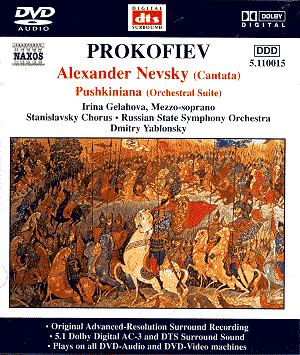This
is an interesting coupling of one of Prokofiev’s most familiar
and acknowledged masterpieces with some unfamiliar music that
most will never have heard before, even heard of
before. DVD-Audio was created for big orchestral/choral works
like Nevsky with rich use of percussion and exotic orchestral
effects. I have loved this music ever since I first heard the
Mario Rossi recording on Vanguard, and used to go regularly to
the cinemathéque to see garbled 16 mm prints of the film.
I studied Russian in college in part so I could understand the
libretto, and used phrases from the text in class—Ya pa-idu
na... (‘I shall have gone across to...’) from the opening
of the aria is the way I remember this construction.
The
tempi are generally slow in the very atmospheric parts, allowing
one to savour the textures. The orchestra is astonishingly clear,
the frequent bass drum notes frighteningly vivid. The chorus achieves
an amazingly detailed characterisation. In The Crusaders in
Pskov, the Germans are feeling sorry for themselves; at the
beginning of The Battle On The Ice, they’re mad as hell
and they’re going to make somebody pay; as they drown in the icy
waters of the lake, they wail and moan realising that not a soul
within a thousand miles has a bit of sympathy for them, all the
while singing mostly the same notes. I guess I am still imprinted
on Anna Maria Iriarte’s clear, soaring, lyrical performance of
the big aria in the Mario Rossi recording; Gelahova sounds close
and solemn to me. Eugenia Gorochovskaya sings on the reconstructed
film soundtrack and is about midway in her approach between the
two others.
My
esteemed MusicWeb colleague Colin Clarke was not
impressed with this performance as issued on regular CD, preferring,
among others, one by Gergiev, a conductor I admire very much,
but whose Nevsky I have not heard. But this recording as
presented here in DVD-Audio is the best version I’ve ever heard!
It is not surprising that good recorded sound could improve the
perception of a performance of this work so dramatically, as it
depends in so many ways on subtle orchestral textures. I recall
other instances where reviewers have revised their rating of the
quality of a performance when it was subsequently reissued in
an enhanced sound format. This is actually ironic in this case
because the original sound reproduction on the film’s optical
sound track was very much poorer in fidelity than the scrappiest
LP sound. But what we are listening to here is the Cantata,
and Prokofiev reorchestrated the music for concert performance.
The recently issued "restored" version of the film with
Temirkanov conducting the full orchestra score re-recorded onto
laserdisk and VHS (apparently NTSC only) apparently had its orchestration
enhanced to match the published cantata, rather than working from
the original orchestral parts. There is both more music and less.
The battle music and bell ringing are extended somewhat, but the
first part of the aria is not sung, only the later parts, and
the final celebration music seems shortened. The performance is
naturally constrained to follow the timing of the scenes in the
film and one would want this recording only together with the
visual track, although the CD has some extra bonus tracks, presumably
images.
The
seven movement Pushkiniana Suite brings together
a number of shorter pieces from Prokofiev’s vast output of stage
music, and constitutes what could be an Eighth Symphony or a ballet
suite. The quality and interest of the music is high, and the
performance and recording here are everything one could wish.
In
the case of the Hamlet music excerpt we can compare the
same orchestra under two different conductors, both with exceptional
recording quality, and here I would give the nod to Polyansky
with a warmer, closer orchestral balance. This Chandos recording
may come out on SACD and would then be truly formidable. Watch
this space.
The
Ivan music accompanies the brief colour sequence in the
film, a riotous ballet. Järvi plays it with terrific energy,
and a little more weight than Yablonsky, albeit receiving somewhat
brighter and more brittle recorded sound. This one is too close
to call.
So
give your Reiner Nevsky to the church charity sale, and
run, do not walk, to buy this disk. While you’re out buy some
new woofers for your DVD sound system (or upgrade your earphones).
You’ll be glad you did.
Paul
Shoemaker
see
also review of the CD by Colin
Clarke


![]() Alexander Nevsky,
Cantata Op.78 (1937) [35.05]
Alexander Nevsky,
Cantata Op.78 (1937) [35.05] ![]() NAXOS 5.110015 [63.19]
DVD-AUDIO
NAXOS 5.110015 [63.19]
DVD-AUDIO